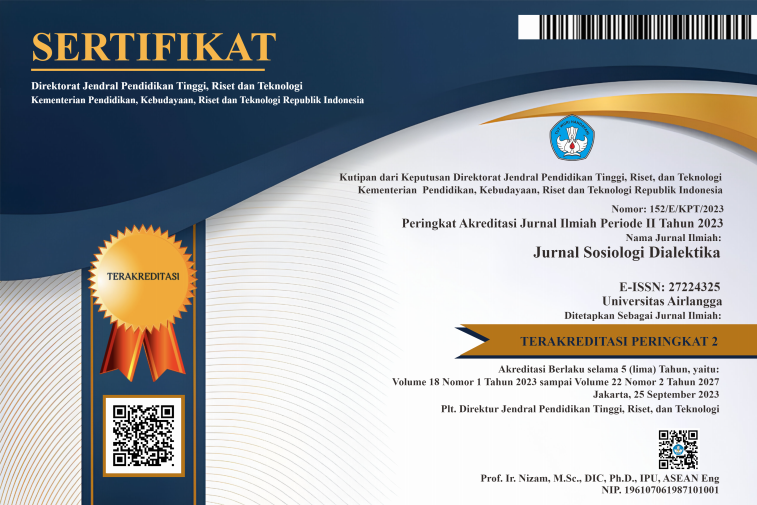Farmer community participation in village building planning in Cikarawang Village, Bogor Regency
Downloads
The stages of implementing Village Development Planning Deliberations are often carried out without involving the farming community so they have not been able to produce the formulation of development programs needed by farmers according to the mandate of Law no. 6 of 2014 concerning Villages, which contains the concept of village development as improving the quality of services, development, and empowerment of rural communities through a participatory approach. The purpose of this study was to determine the typology of farmers based on capital ownership and participation in planning and deliberation of village development planning, the typology of farming communities based on the type and capital ownership of community actors involved in the arena of village planning and development contestations planning meeting. This study uses the constructivism paradigm using qualitative methods with data collection techniques through observation, in-depth interviews, and focused discussions with a case study approach conducted in Cikarawang Village, Dramaga District, Bogor Regency. The result of this research is that the typology of farmers is divided into five types based on their capital ownership, namely Menlen, Biglen, Kolen, Renlen, and Nidlen types. The typology of farming communities in planning and musrenbangdes is passive, informative, functional, interactive and mobilization participation which is also influenced by ownership and capital accumulation.
Adi IR (2001) Pemberdayaan, Pengembangan Masyarakat dan Intervensi Komunitas (Pengantar Pada Pemikiran dan Pendekatan Praktis). Jakarta: Lembaga Penerbit Fakultas Ekonomi Universitas Indonesia.
Alamsyah AR (2010) Islam, Jawara dan Demokrasi: Geliat Politik Banten Pasca Orde Baru. Jakarta: Dian Rakyat.
Amien MA (2005) Rencana Pembangunan Jangka Panjang Nasional 2005-2025. Makassar: Provinsi Sulawesi Selatan.
Anto O (2021) Proses Komunikasi dalam Program Pembangunan Desa (Kasus: Dana Desa di Desa Sungai Kali Kabupaten Barito Kuala Kalimantan Selatan). Bogor: IPB University Press.
Bourdieu P (1977) Outline of a Theory of Practice. Cambridge: Cambridge University Press.
Bourdieu P & Wacquant LJD (1992) The Purpose of Reflexive Sociology: An Invitation to Reflexive Sociology. Chicago: University of Chicago Press.
Bourdieu P (1996) Distinction: A Social Critique of the Judgement of Taste. Chicago: Harvard University Press.
Bourdieu P (1998) On Television and Journalism. London: Pluto.
Bourdieu P (2010) Arena Produksi Pemikiran Bourdieu. Yogyakarta: Pustaka Belajar.
Brubaker R (2000) Social Theory of Habitus. London: SAGE Publications.
Creswell JW & Creswell JD (2017) Research Design: Qualitative, Quantitative, and Mixed Methods Approaches. London: SAGE Publication.
Damanik IPN (2013) Faktor-faktor yang mempengaruhi dinamika kelompok dan hubungannya dengan kelas kemampuan kelompok tani di Desa Pulokencana Kabupaten Serang. Jurnal Penyuluhan 9 (1):31-40.
Halamska M (2011) The Polish countryside in the process of transformation 1989-2009. Polish Sociological Review 173 (1):35-54.
Jenkins R (1992) Pierre Bourdieu: Key Sociologists. London: Routledge.
Kolopaking LM, Apriande C, & Syaharbian R (2016) Mekanisme Perencanaan Desa Membangun dan Membangun Desa. Vol 1 No. 1. Bogor: PSP3 IPB & LPPM IPB.
Krisdianto N (2014) Pierre Bourdieu, Sang Ahli Damai. Surabaya: Universitas Katolik Widya Mandala Press.
Kurniawan B (2015) Desa Mandiri Desa Membangun. Jakarta: Kementerian Desa, Pembangunan Daerah Tertinggal dan Transmigrasi.
Lipton M & Moore M (1980) Metodologi Studi Pedesaan di Negara-Negara Berkembang. Jakarta: Yayasan Ilmu Ilmu Sosial.
Moleong L (2015) Metodologi Penelitian Kualitatif. Bandung: PT. Remaja Rosdakarya.
Mutahir A (2011) Intelektual Kolektif Pierre Bourdieu: Sebuah Gerakan untuk Melawan Dominasi. Yogyakarta: Kreasi Wacana.
Pretty J (1995) Regenerating Agriculture: Policies and Practice for Sustainability and Self-reliance. London: Earthscan Publications.
Sigalingging AH & Warjio W (2014) Partisipasi masyarakat dalam perencanaan pembangunan (studi kasus pada Kecamatan Sidikalang Kabupaten Dairi). Jurnal Administrasi Publik 4 (2):116-145.
Sjaf S (2014) Politik Etnik: Dinamika Politik Lokal di Kendari. Jakarta: Yayasan Pustaka Obor Indonesia.
Sjaf S (2019) Involusi Republik Merdesa. Bogor: IPB Press.
Solekhan M (2014) Penyelenggaraan Pemerintahan Desa. Malang: Setara Press.
Sutoro E (2015) Regulasi Baru, Desa Baru, Ide, Misi dan Semangat UU Desa. Kementerian Desa, Pembangunan Daaerah Tertinggal dan Transmigrasi. Jakarta: Kementerian Desa,Pembangunan Daerah Tertinggal,dan Transmigrasi RI.
Tjokroamidjojo B (1996) Perencanaan Pembangunan Jakarta. Jakarta: PT Toko Gunung Agung.
White S & Pettit J (2007). Participatory approaches and the measurement of wellbeing. [Accessed 02 August 2022]. https://www.iied.org/sites/default/files/pdfs/migrate/G02100.pdf.
Wijaya R (2001) Forum pengambilan keputusan dalam proses perencanaan pembangunan di era otonomi daerah (studi kasus di Kelurahan Jebres Kecamatan Jebres Kota Surakarta). Thesis, Universitas Gadjah Mada: Yogyakarta.

This work is licensed under a Creative Commons Attribution-NonCommercial-ShareAlike 4.0 International License.
1. Copyright of this journal is possession of Editorial Board and Journal Manager, by the knowledge of author, whilst the moral right of the publication belongs to the author.
2. Legal formal aspect of journal publication accessibility refers to Creative Commons Attribution-NonCommercial-ShareAlike (CC BY-NC-SA), implies that publication can be used for non-commercial purposes in its original form (cannot be modified).
3. Every publications (printed/electronic) are open access for educational purposes, research, and library. Other that the aims mentioned above, editorial board is not responsible for copyright violation.















